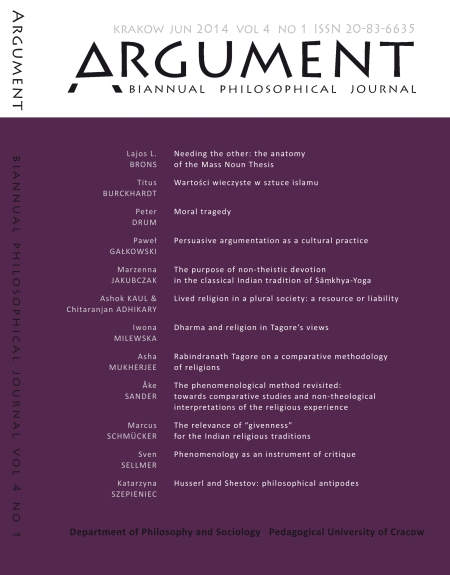The phenomenological method revisited: towards comparative studies and non-theological interpretations of the religious experience
Keywords:
philosophy of religion, sociology of religion, phenomenology of religion, religious studies, comparative studies, comparative methodology, secularizationAbstract
During the last decades, two major and interrelated themes have dominated the study of religion: (a) the theme claiming that the long taken-for-granted so-called secularization thesis was all wrong, and (b) the theme of the so-called “return” or “resurgence of religion”. This global revival of religion — on micro, meso and macro levels — has been chronicled in a number of important books lately. As even a quick glance in some of the many textbooks about religious studies reveal that there are many various ways of studying religion — theologically, sociologically, psychologically, anthropologically, philosophically, etc. — and they can be tackled from many different ideological or theoretical “slants” or perspectives - gender, postcolonial, orientalism, postmodernism, inside/outside, hermeneutical, etc. And it seems to be a general rule within science that the more important, complex and controversial a subject area is perceived to be, the more heated the debate about theory, method and definitions of concepts seems to be within it. Comparative religion can, very broadly, be carried out from two types of data: texts or actual living human beings. During the last thirty or so years, and in tandem with the initially mentioned two themes, the latter - what many scholars now call “lived religion” (Hall, 1997; Orsi, 2005; Ammerman, 2007; Mcguire, 2008) - have more and more come to the fore in departments of religious studies. This can be seen as a “rejuvenation” of Friedrich Schleiermacher’s opinions that the only way to study religion adequately was in and through the religious beliefs and practices of actually living human beings and that the heart of religion was to be found, not in rules and regulations, hierarchies and hymnbooks, but in the individual’s experience of dependence upon a power infinitely greater than his own. The student of religion must, in other words, concentrate, not on what people might do, ought to do, or what the textbooks say they are supposed to do, but on what they actually do, and the ways in which they actually behave, and why they do what they do — their motives, reasons or inducements for doing what they do.


